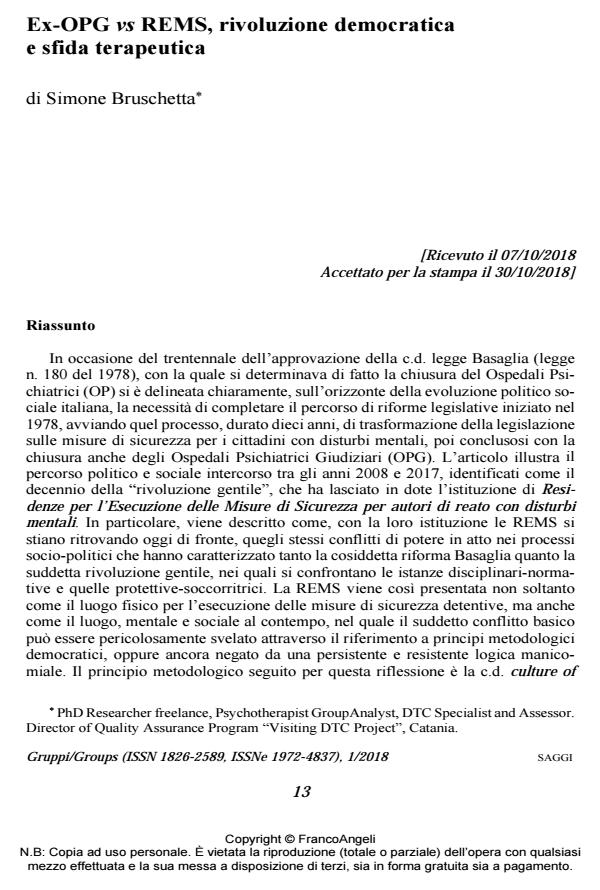Old Forensic Psychiatric Hospital end new Psychiatric Residence for the Execution of Measures of Security (Ex-OPG vs REMS): democratic revolution and therapeutic challenge
Journal title GRUPPI
Author/s Simone Bruschetta
Publishing Year 2019 Issue 2018/1
Language Italian Pages 24 P. 13-36 File size 231 KB
DOI 10.3280/GRU2018-001002
DOI is like a bar code for intellectual property: to have more infomation
click here
Below, you can see the article first page
If you want to buy this article in PDF format, you can do it, following the instructions to buy download credits

FrancoAngeli is member of Publishers International Linking Association, Inc (PILA), a not-for-profit association which run the CrossRef service enabling links to and from online scholarly content.
On the occasion of the thirtieth anniversary of the approval of the c.d. Basaglia law (law n. 180 of 1978), with which the closure of the Psychiatric Hospitals (OP), was de facto clearly outlined, on the horizon of the Italian social political evolution, the need to complete the path of legislative reforms started in 1978, initiating that ten-year process of transformation of legislation on safety measures for citizens with mental disorders, which ended with the closure of the Forensic Psychiatric Hospitals (OPG). The article illustrates the political and social path between the years 2008 and 2017, identified as the decade of the "gentile revolution", which has left the establishment of Residences for the Execution of Measures of Security (REMS) for offenders with mental disorders. In particular, it is described how, with their establishment, the REMS are facing today, those same power conflicts underway in the socio-political processes that characterized both the so-called Basaglia reform and the aforementioned gentle revolution, in which the disciplinary-normative and the protective-rescuer instances are matched. The REMS is thus presented as not only the physical place for the execution of the security measures of detention, but also as the place, mental and social at the same time, in which the aforementioned basic conflict can be dangerously revealed through the reference to democratic methodological principles or else denied by a persistent and resistant asylum logic. The methodological principle followed for this reflection is c.d. culture of enquiry of the tradition of the British Democratic Therapeutic Communities, which today arises as the foundation of the organization of every residential treatment based on a model of mental health that respects the human rights of patients and citizens.
Keywords: Forensic Psychiatric Hospital, Residence for the Execution of Measures of Security, Democratic Therapeutic Community, Culture of enquiry, Mental Health Community-Based, Psychotherapy Community-Focused.
Simone Bruschetta, Ex-OPG vs REMS, rivoluzione democratica e sfida terapeutica in "GRUPPI" 1/2018, pp 13-36, DOI: 10.3280/GRU2018-001002